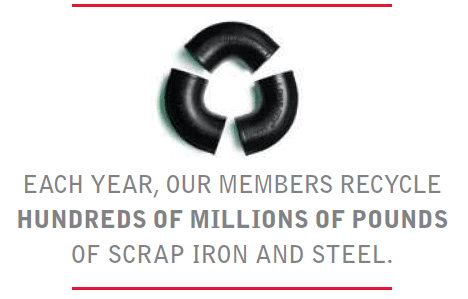100% Recyclable - Cast Iron Soil Pipe
Turn Over a New Leaf
April 21, 2021 marked the 50th year anniversary of Earth Day. Cast iron soil pipe has been a green product for longer than that. Commercial plumbing systems can turn over a new leaf and embrace materials that are made of at least 96% recycled post-consumer materials.
Cast Iron Soil Pipe Has Been Green From the Beginning.
While cast iron is not a new product, it does have a green pedigree. Cast iron soil pipe is made from at least 96% recycled materials. Hundreds of millions of pounds of post-consumer scrap iron and steel is diverted from landfills by our members who convert it into cast iron soil pipe and fittings. Cast iron soil pipe and fittings is 100% recyclable. Cast iron piping systems can be recycled to make new cast iron pipe and fittings. But there’s more to cast iron soil pipe’s sustainability. Our members also recycle the foundry sand used in the production processes multiple times. When the inert sand can no longer be used in the casting process it is often reused in other applications such as highway construction and structural fill.

Manufacturing and the Environment
CISPI members have spent tens of millions of dollars over the last several decades to voluntarily install new equipment or upgrade old equipment to improve environmental control systems. Additionally, they spend many millions more each year to operate and maintain these systems. Domestically manufactured cast iron soil pipe doesn’t have the environmental impact as other countries such as China because of the protections in place in the U.S.
For example, castings imported to the U.S. from China are made using antiquated labor-intensive methods that are significantly less energy efficient and therefore produce more greenhouse gas (GHG) emissions. Additionally, Chinese foundries still use pig iron as the primary raw material for producing castings. This results in GHG emissions that are an estimated 100%- 200% higher per ton of good castings shipped, according to the American Foundry Association. Products manufactured off-shore also contribute significantly more GHG emissions as they rely on inland freight within China and via cargo ships to the U.S.
If domestic castings are easier on the environment than foreign-made pipe and fittings, what about plastics? Unlike cast iron soil pipe which is 100% recyclable at the end of its useful life, a lot of plastic pipe fills our landfills. Also, plastic pipe and fittings are joined using solvent cements that contain volatile organic compounds (VOCs). Installing cast iron is fast and easy. A snap cutter and a torque wrench is all that’s needed. The cleaning fluids or solvent cements required with plastics are not required for cast iron which is better for the environment.
Turn over a new leaf and specify cast iron soil pipe and fittings.
The Institute’s field representatives, the Cast Iron Crew, are available for training and consultation.
FIND YOUR CISPI REP TODAYSubscribe to CISPI eNews
Subscribe to the Institute’s eNewsletter, Cast Iron Crew News.
Subscribe NowSubscribe to CISPI eNews
Subscribe to the Institute’s eNewsletter, Cast Iron Crew News.
Subscribe Now